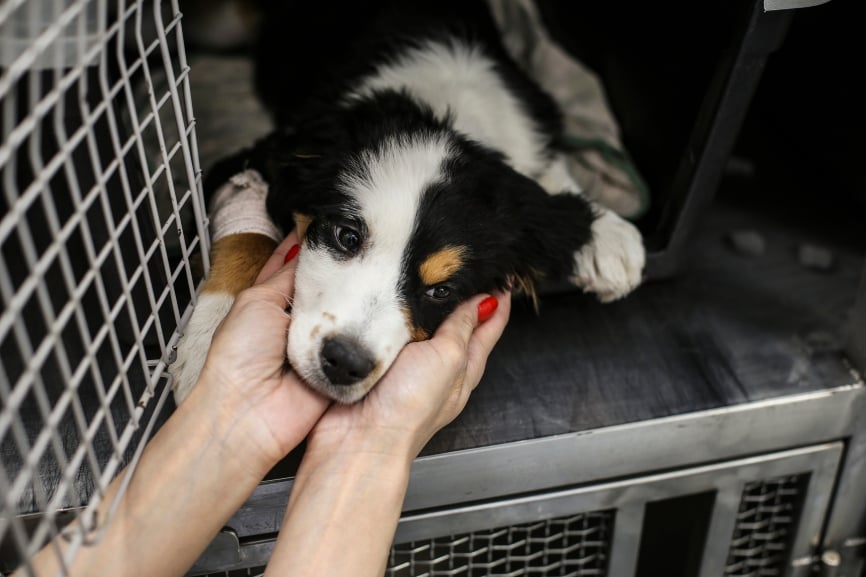Table of Contents
By Laura Wolf, guest author
Key Takeaways
- Van life is becoming an increasingly popular lifestyle, whether for long trips or full-time life on the road.
- Living with pets in a camper or RV is possible and gratifying, with careful planning and awareness of the challenges it poses.
- Before you go, carefully research rules at your destinations, and be prepared for the unexpected, which is inherent in life on the road.
 Van life, RV life, bus life, living-out-of-your-car life—these are all terms that once sounded extreme or far-fetched to mainstream America. But as other types of travel became extremely limited due to COVID-19 restrictions and more folks embraced the freedom of working remotely, road life is now a thriving lifestyle choice. It was even documented in the 2020 Oscar-winning film “Nomadland.”
Van life, RV life, bus life, living-out-of-your-car life—these are all terms that once sounded extreme or far-fetched to mainstream America. But as other types of travel became extremely limited due to COVID-19 restrictions and more folks embraced the freedom of working remotely, road life is now a thriving lifestyle choice. It was even documented in the 2020 Oscar-winning film “Nomadland.”
Whether you’re considering life on the road full time or heading out for a weekend, traveling with pets can present challenges you might never have considered. It can also be one of the most rewarding experiences of your life, with the right considerations and planning.
I did the full-time van life thing in my ‘84 Westy (Volkswagen Westfalia camper van) for a year and a half with my rescued Chiweenie Boomer, including a five-month loop from Washington state to the southern tip of Baja, Mexico and back. Boomer and I have been together 10 years now, since I first picked her up at the shelter, and we’ve logged a lot of hours on the road together.
We’re on our third van now and through it all, we’ve had many adventures and lived to tell the tales. I also tapped some fellow road travelers for their words of wisdom to share with y’all.
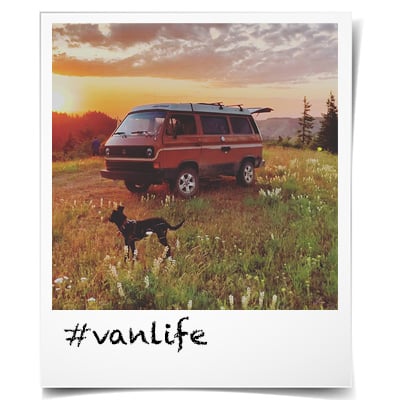 Preparing to travel with your pets
Preparing to travel with your pets
A lot goes into planning a road trip, and even more so when you’re responsible for keeping your pets healthy and happy on the road. I’ve learned a lot by traveling with Boomer over the last 10 years, and a couple of my road life friends I’ve met along the way have also shared their wisdom.
Consider how the weather may affect your pet
Arguably the most critical factor to consider is what the weather is going to be like on your trip and how hot (or cold) it will be in your rig while you’re on the road—both when you’re parked and while driving. You might have to change your plans last minute if the weather up ahead looks unsafe for your pets. It’s part of the journey.
I learned the hard way that living and traveling in a vintage van with no AC or power windows makes traveling with pets super challenging regarding the weather. In addition to Boomer getting stung by the occasional bee that flew in while driving with the windows down, hot weather limited when and where I could go. Ultimately, I sold that van for one with AC. The things we do for our pets.
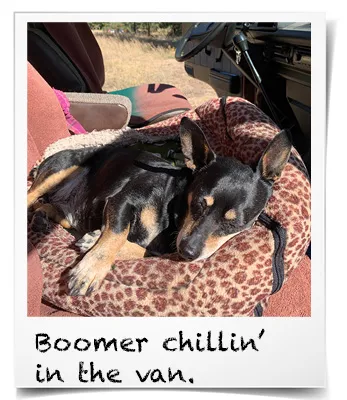 Hopefully, this goes without saying, but avoid leaving your pets in your rig anywhere that could be even close to too hot (any time the outside temperature is above 70 degrees F) Mainly for your pets’ safety, and to avoid someone reporting you to the police for animal abuse. Unfortunately, there is still a lot of stigma associated with road life, and folks can be quick to judge people enjoying this lifestyle.
Hopefully, this goes without saying, but avoid leaving your pets in your rig anywhere that could be even close to too hot (any time the outside temperature is above 70 degrees F) Mainly for your pets’ safety, and to avoid someone reporting you to the police for animal abuse. Unfortunately, there is still a lot of stigma associated with road life, and folks can be quick to judge people enjoying this lifestyle.
Visit your veterinarian before you set off
Before any trip, be sure all shots are current, stock up on any medications or prescription food, or have the vet write up prescriptions that you can fill elsewhere. If they’re not already microchipped, get it done.
Ask your vet for hard copies of your pet’s medical records so you can present their proof of rabies vaccine if needed (required when crossing Mexico + Canada borders), and to share their medical history with any vets while traveling.
Depending on where you’re going, your pet might need a different medication or vaccination that you hadn’t considered. I was unaware that Boomer needed to start on heartworm prevention medicine in advance of, during, and for several months after our time in Mexico, but because we saw a vet with ample time before we crossed the border, we were prepared.
Does your travel set-up accommodate your pets?
Just because you can fit them in your rig doesn’t mean that your vehicle is set up for pet habitation. Pets love routine, and you’re taking much of that away when on the road. Prioritize your pets and make sure you incorporate their needs into your road life rather than dragging them along for the ride.
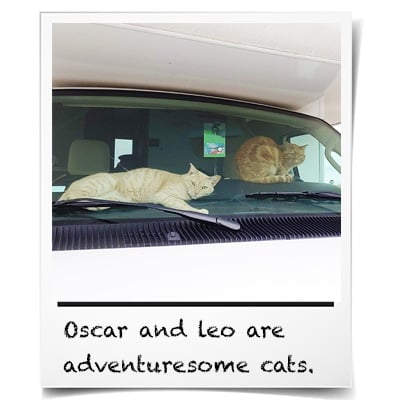
For the cat folks out there, some words of wisdom: if you have a small camper and a cat with stinky bathroom habits, be prepared to pull over to clean the box immediately or live with the smell!
Give your pets time to adjust to their new surroundings
This was not an issue for Boomer and me since she was already accustomed to shorter trips on the road before moving into the van full-time. But this is not the norm, and experienced folks recommend taking a few practice runs close to home to give them time to designate their spot and get comfortable in the rig.
Are dogs allowed?
 Don’t assume that where you’re going allows dogs, even campgrounds and parks. Research in advance whether an area you want to visit is run by the state, is a national park, or something else altogether—and check their dog policy. Public beaches have specific rules that vary by state and county. I was surprised to learn that some parks completely prohibit pets on the trails, even when leashed. And just because they’re allowed, it might not be suitable for them.
Don’t assume that where you’re going allows dogs, even campgrounds and parks. Research in advance whether an area you want to visit is run by the state, is a national park, or something else altogether—and check their dog policy. Public beaches have specific rules that vary by state and county. I was surprised to learn that some parks completely prohibit pets on the trails, even when leashed. And just because they’re allowed, it might not be suitable for them.
Expect the unexpected
Anyone who lives this lifestyle will tell you that there’s nothing like the freedom of being on the road. That shirking the monotony of the day-to-day grind is the most rewarding thing they’ve ever done. One of the best things about it is that no day is ever the same because every day is a new adventure.
This also goes for your pets. Every day will also be new to them, which is tough for creatures accustomed to routine. You can’t prepare for every little thing that could go wrong, but you can expect things to go wrong. If you’re on a tight budget, set aside money for pet emergencies. I’ve ended up at more than one vet on the road, which is never fun, but you can make it less stressful by being mentally and financially prepared. If you have pet insurance, this will ease the financial blow of unexpected accidents and illnesses, and you can go to any licensed vet in the U.S.
Is van life with your pet worth the trouble?
 No one can answer this for you, but if you put some time and effort into researching and preparing before you go, you’ll know what’s right. It’s also going to depend on your pet’s temperament and physical needs.
No one can answer this for you, but if you put some time and effort into researching and preparing before you go, you’ll know what’s right. It’s also going to depend on your pet’s temperament and physical needs.
The challenges should be carefully considered. Having your pets with you can limit where you go and when you go there. Unexpected vet visits on the road throw a wrench in your plans and budget.
Traveling on the road alone is not uncommon, and for me, having my furry BFF with me gave me so much comfort that I can’t imagine not having her with me. Whether you’re alone or with others, the constant love, affection, security alarms, and increased incentive to go for walks and hikes are all great reasons to bring them with you.
You’ll create unforgettable memories together—the good, the bad, and, sometimes, the ugly—that just might change your outlook on life.
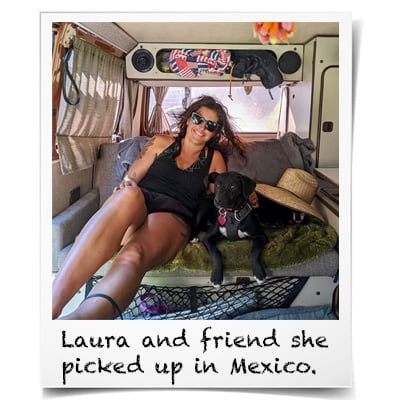 About Laura: Following 12 years in Seattle, my dog Boomer and I left the city in 2019 to live, work, and travel in my VW van full-time. We eventually landed in Baja, Mexico for a few months before COVID hit and we returned stateside in search of a new place to call home and focus on growing my business. Bend, Ore. is that place as of January 2021. We live in a house now, but we’ll always have a van.
About Laura: Following 12 years in Seattle, my dog Boomer and I left the city in 2019 to live, work, and travel in my VW van full-time. We eventually landed in Baja, Mexico for a few months before COVID hit and we returned stateside in search of a new place to call home and focus on growing my business. Bend, Ore. is that place as of January 2021. We live in a house now, but we’ll always have a van.
Instagram: @BajaMidnight + @BoomerTheChiweenie
Special thanks to my buddies who contributed their traveling-with-pets expertise for this article. Check ‘em out on the socials for more about their adventures on the road with their fur buddies.
Missy and Matt, dogs Frankie and Gunner. Live full-time in their Toyota Coaster; Instagram: @MissyAndMatt
Lyndsey, cats Oscar and Leo. Lived in an RV for a year; Instagram: @off_to_the_meowtains
Protect your pets from those unexpected accidents and illnesses, with no limits on payouts. And, if something should happen while traveling with your pet, you can use any licensed veterinarian in the U.S., including emergency and specialty care. Get a quote and make sure you’re covered for those dog and cat mishaps and unpleasant surprises.



